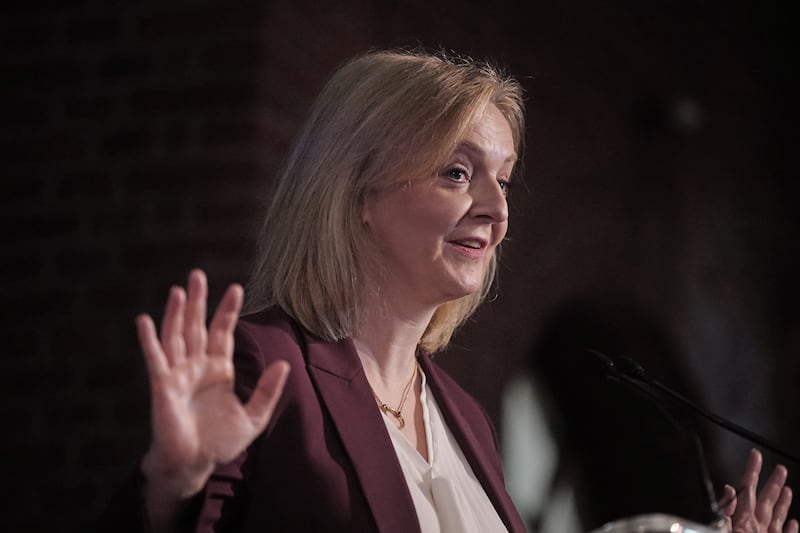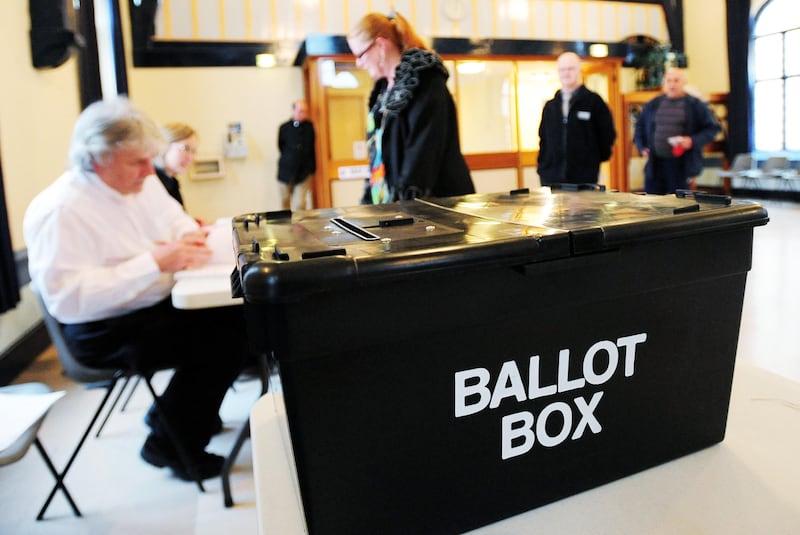Confusion about new voter ID laws could prove decisive for senior Conservatives including Rishi Sunak and Liz Truss at the next election, a new poll has suggested.
A mammoth poll conducted on behalf of campaign group Best for Britain found 16% of people did not know that they would need photo ID to vote in upcoming local and general elections, meaning around five million voters could be turned away from polling stations.
The poll of 15,000 people suggested the Conservatives were on course for their worst ever defeat, projecting the party would win just 98 seats on the basis of current polling.
High-profile figures including the Prime Minister, the Chancellor and Liz Truss saw their majorities slashed to less than 5% in the projections, with Best for Britain claiming a lack of awareness about voter ID requirements could prove “decisive” for those MPs.
The campaign group said around 1.85 million people in marginal seats did not know about voter ID rules, including around 9,800 people in the Prime Minister’s constituency and a similar number in Ms Truss’s.
Other MPs whose seats could depend on voter ID knowledge included Dame Priti Patel, Michael Gove and Suella Braverman.
Naomi Smith, chief executive of Best for Britain, said: “While polls suggest it won’t be enough to change the result of the next general election, the introduction of unnecessary photo ID could be the difference between victory and defeat for high profile Conservatives in marginal constituencies.”
The polling also suggested the requirements could harm smaller parties’ chances of making gains, with around 9,600 people unaware of the rules in the Green target seat of Waveney Valley and around 10,000 unaware in Lib Dem target seats St Ives and South Cambridgeshire.
Confusion about ID requirements was highest among those aged 18-24, where 27% did not know about the rules, compared to 6% of the over-65s.

Around 27% of voters in Scotland and 20% of voters in Wales were unclear about voter ID rules, and the poll found higher levels of confusion among ethnic minority groups.
Photo ID requirements were brought in as part of the Elections Act 2022, with the Government saying they were necessary to combat the risk of in-person voter fraud.
But campaign groups such as Best for Britain have criticised the move, saying in-person voter fraud was incredibly rare and the requirements disadvantaged young people and ethnic minorities who were less likely to vote Conservative.
The Government has previously denied this, saying earlier this year that 96% of voters held acceptable forms of ID and describing the requirement as “a reasonable approach to combat the inexcusable potential for voter fraud in our current system”.
The Department for Levelling Up, Housing and Communities also said it would “work closely with local authorities and other partners to raise awareness” about the requirements.
A spokesperson for the department said: “As recommended by international election watchdogs, we introduced a requirement to show photographic identification for voting in person across Great Britain, in line with the longstanding arrangements in Northern Ireland.
“We are committed to ensuring everyone can have their say in our democracy, and the Electoral Commission will continue to conduct public awareness campaigns ahead of each set of relevant polls.
“The vast majority of voters in the polling station – 99.75% – cast their vote successfully at the local elections in England last May.”
A report by the Electoral Commission last June suggested around 14,000 people – 0.25% of voters – did not vote after being unable to show an accepted form of photo ID during the local elections.

Accepted forms of ID include a passport, driving licence or some concessionary travel passes, mainly those available to older people such as an older person’s bus pass, but also Blue Badges and disabled person’s bus passes. Travel passes for younger people, such as the 18+ Oyster card in London, are not accepted.
People who do not have a valid form of ID can apply to their local council for a free “voter authority certificate” which will allow them to vote.
In a separate piece of research, the Electoral Commission found just 58% of people aged between 18-24 were aware of the requirement for voter ID, compared to 91% of those aged over 65.
The elections watchdog urged younger people who need voter authority certificates to apply for them before the deadline of 5pm on April 24.
Craig Westwood, director of communication, policy and research at the Electoral Commission, said: “These elections are an important way to have a say on the issues that impact local communities, so we encourage all young people to ensure they are ready to cast their ballot.”
The Best for Britain poll was carried out by Survation between March 8 and 22, and was undertaken using MRP analysis.








